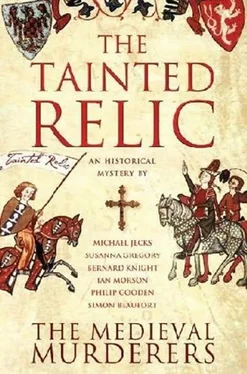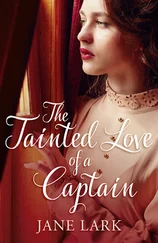‘Witney was interested in Andrew’s Holy Blood relic,’ began Michael. ‘Are you sure he did not try to take it from him? Your Order is intent on preserving such items from destruction by the Dominicans. Perhaps he tried to seize it in a misguided attempt to protect it-to take it from a feeble old man who would be unable to repel the determined advances of single-minded Black Friars.’
Seton sighed. ‘I was not going to bother you with irrelevant detail, but Witney was not an adherent of my Order’s teachings-he did not accept the validity of such relics. But why do you ask? Have you come around to my way of thinking: the Carmelites killed him?’
‘Did you like Witney?’ asked Michael, declining to reply.
Seton was taken aback. ‘I have known kinder, more gracious men, but I did not kill him, if that is what you are asking. I heard what you found on the roof, but I am not a man to scramble up buildings, Brother. That sort of agility is for the likes of young Urban.’
‘Did you see Urban by the chimney?’ asked Bartholomew. ‘Or covered in bits of thatching to suggest he had been climbing?’
‘No,’ admitted Seton. ‘But I paid little attention to him or his master, because I considered them beneath my dignity. It was Witney who engaged them in conversation. But, now I think of it, Urban did climb a ladder at one point. There was a pigeon’s nest near our window, and the constant coos and flaps were disturbing Witney, so Urban offered to knock it down for him. There! I have proved your case, Brother: Urban is an experienced user of ladders and happy on roofs.’
‘I hardly think-’ began Bartholomew, but Seton was not to be deterred.
‘And whoever murdered Witney was a man with exactly those skills. Urban is the villain, just as I predicted.’
It was clear they would learn no more from Seton, so Bartholomew and Michael took their leave.
Bartholomew followed Michael out of the hostel into the intense glare of the afternoon sun. Michael gasped at the sudden heat, then insisted they visit the Brazen George for cool ale while they discussed what they had learned. Although scholars were not permitted in taverns, Bartholomew felt the humidity was unpleasant enough to warrant some rule-breaking. He followed the monk into a peaceful room at the back of the inn, where they were served ale that had come directly from one of the deeper cellars. It was clear, cold and refreshing, and he began to feel somewhat revived. The same could not be said for their progress on the case, however, and although they discussed it at length, neither had anything new to add. They were staring disconsolately into the dregs of their ale when the door opened, and Little Tomas walked in.
‘Your beadles said I might find you here,’ he said pleasantly. ‘I understand you have been looking for me-to ask about the fact that the Roughe brothers have been trying to kill me.’
If Michael was disconcerted by the bald pronouncement, he masked it. ‘Yes,’ he replied. ‘You are aware of what Kip and John have been doing?’
Tomas smiled as he took a seat. ‘It is difficult not to notice a crossbow bolt that misses you by the length of a finger, or a horse that tries to ride you down. They also shook the ladder when I climbed it yesterday-endangering Bartholomew into the bargain. Of course I have noticed.’
‘And what have you done about it?’ demanded Michael.
‘Nothing. Their attempts are clumsy, and I am never in real danger-although the crossbow bolt was a little close for comfort.’
‘Why are you so sanguine about it?’ asked Bartholomew. ‘Most men would confront their would-be assassins and demand to know what they are about.’
‘I do not need to ask; I know exactly why they have taken against me. None of the other Cambridge Dominicans is a scholar, and neither they nor their servants understand why I devote my life to books. Also, I am from a university in a country they have never heard of, and I look, speak and behave differently from them. I am a stranger, a foreigner, and therefore suspect. Their dislike of me is simple ignorance, no more and no less.’
Bulmer had admitted as much and so had the Roughe brothers, and Bartholomew supposed that, even in a university town, it was possible for advanced scholarship to be considered an unnatural vice. Also, the Black Friars tended to be local-even Welsh and Irish scholars were regarded as aliens, so someone from the mysterious-sounding Pécs would be an obvious target for their petty hatreds. Michael was not content with Tomas’s explanation, however.
‘They think you are an inquisitor. Are you?’
‘There are Dominican inquisitors who report incidents of heresy to our Master-General, but they are Englishmen, who blend in with the host community. They are not foreigners whom no one will trust. Such a ploy would be pointless.’
‘Is that a yes or a no?’ pressed Michael.
‘It is a no,’ replied Tomas, a little impatiently. ‘I am just a scholar and a priest.’
Michael was about to ask him more about his interest in Witney’s death-and his stance on Holy Blood relics-but there was a knock on the door and one of Michael’s beadles entered.
‘You are asked to go to the river, near the quays, Brother,’ he said breathlessly. ‘There has been an accident, and the dead man is said to have been staying in St Bernard’s Hostel.’
Bartholomew jumped to his feet. ‘Who? Seton?’
The beadle shook his head. ‘An old man wearing a White Friar’s habit.’
‘Do you mean Father Andrew?’ asked Tomas in an appalled whisper. ‘Dead?’
Bartholomew glanced at him, startled by his sudden pallor. Afraid he might swoon, he leaned forward to take his arm. Tomas did not notice, and fixed his dark, intense eyes on the beadle as he waited for a reply.
‘I did hear his name was Andrew,’ acknowledged the beadle.
‘God save us!’ breathed Tomas. When he raised his hand to cross himself, it shook so much that he was barely able to complete the motion.
‘What is the matter?’ asked Bartholomew, certain there was more to his shock than hearing about the death of a man he had, by his own admission, never met. As proctor of Pécs, he would have seen death on a daily basis-assuming he had been telling the truth about his previous vocation, of course.
‘I have not been entirely honest with you,’ said Tomas, accepting the remains of Bartholomew’s ale and taking a tentative sip. ‘You were right: I do have more than a passing interest in this case. I am one of many Dominicans scattered across the country whose task it is to listen for information about Holy Blood relics and their movements. And Andrew’s sounded particularly important.’
‘An inquisitor?’ demanded Michael angrily. ‘You just denied that.’
‘Not an inquisitor,’ said Tomas. ‘An observer . It is not the same thing.’
‘It is,’ declared Michael. ‘Remember that fish-head John Roughe left on me at your priory? It sat on my shoulder without my knowledge and surveyed us all with its flat, watchful eyes. Well, that is what your kind is like, Tomas. A fish-head perched on the shoulders of honest men.’
Bartholomew and Michael hurried towards the quays with Tomas at their heels. Michael had tried to dissuade the Dominican from coming with them, but the man was insistent. His face was grim as they walked, leading Bartholomew to wonder whether they had learned all there was to know about his connection to the relic and its carriers.
Because it was the end of a market day, the streets were choked with carts, and people and animals were everywhere. Cattle lowed as they were driven towards Slaughterhouse Row, while chickens flapped and geese strutted in hissing gaggles. A dog barked furiously at a herd of sheep, and a donkey brayed its displeasure at the cacophony. The smell of animal dung and urine was overpowering, so strong under the baking summer sun that Bartholomew felt himself become breathless from want of clean air.
Читать дальше












